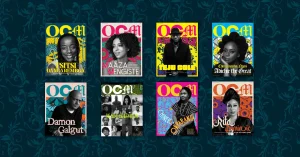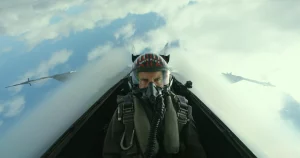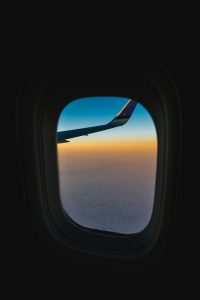From “Blue Lake, Small Island,” snippets of an un-noted experience.
Four or so minutes after we touched down in Bole International Airport in Addis Ababa, right after we climbed the steps to the long passage in Terminal 1, a small crowd of about twenty—women, men, bags on their backs, boxes in their hands—stood blocking the way, shouting. We stopped. “Are these our people?” a woman said in Igbo. The scene was unmistakably Nigerian: it seemed like a fight but turned out to be an intense struggle: two or three men trying to retrieve something from a quite ferocious Airport Official, who it seemed, from the chatter around, had seized their passports. “You must explain to us—why!” A few other Airport Officials were rushing to the scene, wielding batons. It could have been taken from a news report on TV, this scene of lighter-skinned, weapon-wielding security men angry and terrified at these bold black men who must be contained with force. “You think you can intimidate us? You are racist! Racists!” I walked past the rowdiness, wondering how many people’s first times in Addis Ababa are marked by such drama as this, such drama as I’d been warned about.
The next ten minutes was quick: I joined a very wrong queue, I stood there for minutes, I asked an official for clarification, I rushed up the staircase, I stood watching a board with ticketing locations, I joined another long queue tucked into a zig zag, I pulled off my shoes, my belt, my phone—it was hectic.
I’d been in Terminal 2’s Gate 4 for an hour before I spotted Nkiacha Atemnkeng. Nkiacha is Cameroonian, works in Duala Airport, writes for Bakwa magazine, and is headed to Entebbe as well. I walked up to draw his attention, and then we made our way to the last row of seats, to where I’d been sitting between a young man who looked Eastern European, who’d asked me “Kigali?,” and a young woman I hadn’t spoken to but whose blue ankara, the familiar white-flowery design imprinted on it, suggested she wasn’t just Nigerian but also Igbo. Nkiacha sat in the row ahead of ours. We’d last seen at last November’s Ake Arts and Book Festival in Abeokuta—so, catching up.
The hall was long and full, people cluttered on the passage, streaming up and down it, looking Ghanaian or Nigerian and Ethiopian or Sudanese and Lebanese and South African and Eastern European. A dark-skinned young man with wavy hair came up to me and spoke words.
“I’m sorry, I don’t understand you. I understand only English,” I said.
He was smiling, defiant. He repeated his words.
“He’s speaking English,” Nkiacha said in laughter. “He’s asking where those going to South Africa are.” Nkiacha turned to him: “What time is your flight?” In the next four or so minutes, after he had asked where we were from and said he was Somali, the young man stood near the Eastern European, engaged in a language Nkiacha said was only English in their accent. Minutes later, we got up and headed for Gate 4.



2 thoughts on “A Language Problem”
Wow, this is epic. Banging writing. I remember that guy who spoke English which you didn’t understand – aided by my Douala Airport experience. Lol. And I remember you telling me about that chaotic encounter too. Ironically though, I have been through Bole thrice and never experienced such. (So this is rich material for my aviation fiction!)…We would all be reminded of the racist attitudes of Ethiopians again in Bulago Island by Michela Wrong, when I would read an excerpt of my novel manuscript, about a Cameroonian baby born on board a plane in the Addis skies, upon landing.
When i saw Bole, my mouth watered. Thought it was the riverine dish of roasted plantain, fish and yam mixed in oil sauce garnished with pepper and ugba.
Lol, i feel you bro.